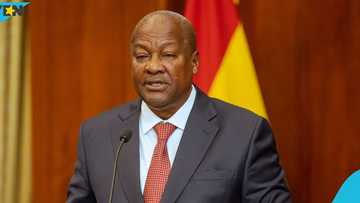By Ameyaw Debrah
The 29th Ghana Journalists Association (GJA) Awards held at the Manhyia Palace was, without a doubt, a refreshing departure from the usual Accra-based fanfare. Under the gracious patronage of the Asantehene, Otumfuo Osei Tutu II, the ceremony was grand, symbolic, and a fitting way to celebrate Ghanaian journalism beyond the capital.

Source: UGC
I wasn’t able to watch the full event due to another engagement, but I caught parts of the broadcast on Facebook Live—and I must say, I was impressed. The production was prompt, the pacing decent, and the setting beautiful.
But as the night wore on and various winners were announced, I found myself both proud and puzzled. Proud, because journalism in Ghana is still alive and competitive—321 entries is no small feat.
Yet puzzled, because some of the categories being presented made me pause to ask: What are we really rewarding here?
Seeing awards like Best English TV Station, Best Akan/Twi TV Station, and Best TV Entertainment Show left me wondering whether the GJA Awards are slowly drifting toward the populist path of the Radio and Television Personality (RTP) Awards.
The GJA, historically, is supposed to be the gold standard for journalistic excellence—the platform that celebrates depth, impact, and integrity in the media.
When we begin to introduce categories that mirror popularity-driven contests, we risk blurring the lines between journalistic merit and mass appeal.
Journalism, after all, isn’t about who has the most viewers or the most entertaining show—it’s about who serves the public interest with truth, balance, and depth.
Awards like Best Akan/Twi Radio Station or Best English TV Station sound more like broadcasting performance indicators than journalistic achievements.
If the goal is to celebrate the craft, then the focus should remain on impactful storytelling, investigative courage, and ethical consistency.
That’s why I found it refreshing that Ridwan Karim Dini-Osman, Justice Baidoo, Philip Teye Agbove, and Nabil Ahmed Rufai were among those recognised for their substantive work.
These are journalists whose stories have challenged power, informed public debate, and expanded understanding.
That’s what the GJA Awards should be about—recognising those who shape the nation’s conscience through rigorous journalism, not those who simply entertain us on weekend TV.
I understand the temptation to make the awards more inclusive or engaging. But the GJA does not need to compete with the RTP Awards.
Its credibility lies precisely in not being populist. It must remain the bastion of professional merit—a space where journalists are celebrated not because they’re popular, but because their work matters.
This year’s theme, “Safeguarding Ghana’s Future: The Role of the Media in Promoting Peace, Security, and the Fight Against Galamsey,” was timely and serious.
To live up to that spirit, the award categories must align with it. When we dilute the focus, we risk turning an institution of integrity into another popularity contest.

Read also
“Freedom of speech does not mean freedom to ruin reputation”: Mahama tells kournalists at GJA Awards
As the GJA continues to evolve, I hope future editions will take a hard look at which categories truly serve the purpose of strengthening Ghanaian journalism.
The ceremony at Manhyia was beautiful; the energy was inspiring. Now, let’s make sure the focus remains on what truly sets the profession apart—courage, ethics, and excellence in storytelling.
The author is the founder of Ameyaw Debrah Media.
Phone+233264-AMEYAW
Source: YEN.com.gh
Source: Yen.com.gh












